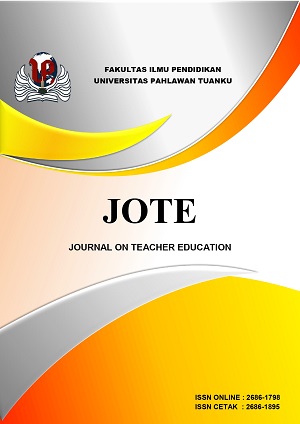Efektivitas Pendidikan Kesehatan dalam Meningkatkan Pengetahuan Pencegahan Skabies pada Penderita Skabies
Abstract
Scabies is one of the most neglected tropical diseases. Scabies is contagious and spreads quickly due to the use of shared personal items, improper prevention and control, and unhealthy environmental conditions. This condition can be prevented if the community knows the characteristics and how to prevent and control scabies. Based on these conditions, the purpose of implementing this activity is to increase the knowledge of people with scabies about how to prevent scabies. The lecture method was used to deliver health education materials on the prevention of scabies. Respondents' knowledge was evaluated by comparing the mean scores of pre-test and post-test. Based on the Wilcoxon test results, there was a significant difference between the mean pre-test and post-test knowledge scores (p-value <0.05). In the short term, health education results in a change or increase in knowledge, but if given continuously and sustainably, it will affect behavior as a medium-term impact.
Keywords
Full Text:
PDFReferences
Al-Dabbagh, J., Younis, R., & Ismail, N. (2023). The currently available diagnostic tools and treatments of scabies and scabies variants. An updated narrative review. Medicine, 102(21), 1–7.
Al Hijrah, M. F., Djalaluddin, N. A., Heriyati, H., & Hamid, A. (2021). Pemberdayaan ospi dan poskestren dalam pencegahan penyakit skabies. Community Development Journal : Jurnal Pengabdian Masyarakat, 2(3), 802–806. https://doi.org/10.31004/cdj.v2i3.2608
Burki, T. (2023). Scabies: the neglected tropical disease that is everywhere. The Lancet Infectious Diseases, 23(10), e405–e406. https://doi.org/10.1016/s1473-3099(23)00584-4
Gupta, S., Thornley, S., Morris, A., Sundborn, G., & Grant, C. (2025). Global trends and prevalence of scabies : a spatiotemporal analysis using Global Burden of Disease 2021 data.
Haiya, N. N., Ardia, I., Nasiroh, A., & Azizah, I. R. (2021). Pedidikan kesehatan mempengaruhi tingkat harga diri penderita skabies di pondok pesantren. Jurnal Ilmu Keperawatan Dan Kebidanan, 12(2), 418–424.
Li, J., Liu, Z., & Xia, X. (2024). The disability-adjusted life years (DALYs), prevalence and incidence of scabies, 1990-2021: A systematic analysis from the Global Burden of Disease Study 2021. PLoS Neglected Tropical Diseases, 18(12), e0012775. https://doi.org/10.1371/journal.pntd.0012775
Maywati, S., & Hidayanti, L. (2019). Pemberdayaan masyarakat dalam pencegahan air borne disease. Jurnal Pengabdian Siliwangi, 5(2), 89–92.
Micali, G., Giuffrida, G., & Lacarrubba, F. (2018). Scabies. Diagnostics to Pathogenomics of Sexually Transmitted Infections, 367, 357–371. https://doi.org/10.1002/9781119380924
Notoatmodjo, S. (2007). Kesehatan masyarakat: ilmu dan seni. Rineka Cipta.
Notoatmodjo, S. (2010). Konsep perilaku kesehatan. In Ilmu Perilaku Kesehatan. Rineka Cipta.
Puskesmas Cibeureum. (2023). Laporan Tahunan Puskesmas Cibeureum Tahun 2023.
Romani, L., Steer, A. C., Whitfeld, M. J., & Kaldor, J. M. (2015). Prevalence of scabies and impetigo worldwide: A systematic review. The Lancet Infectious Diseases, 15(8), 960–967. https://doi.org/10.1016/S1473-3099(15)00132-2
Rosmawati, A. F., Sopiah, P., & Rosyda, R. (2023). Hubungan konsep diri dengan kualitas hidup penderita scabies pada santri di pondok pesantren. Jurnal Kesehatan Masyarakat, 7(1), 808.
Seetan, K., Rashdan, Y., Alsharei, A., Al Bashir, S., Al Madani, A., Alqa’dan, M., Al Momani, A., & Al samarah, H. (2021). Impact of socio-demographic factors on knowledge, attitude and practices toward scabies among syrian refugees in Jordan: A prospective cross sectional study. Annals of Medicine and Surgery, 69(July), 102738. https://doi.org/10.1016/j.amsu.2021.102738
Trasia, R. F., & Sari, I. P. (2020). Respon imun hospes terhadap sarcoptes scabiei. Jurnal Biomedika Dan Kesehatan, 3(4), 183–192. https://doi.org/10.18051/jbiomedkes.2020.v3.183-192
World Health Organization. (2020). Ending the neglect to attain the Sustainable Development Goals. In WHO (World Health Organization). https://apps.who.int/iris/handle/10665/70809
DOI: https://doi.org/10.31004/abdira.v5i3.652
Refbacks
- There are currently no refbacks.
Copyright (c) 2025 Wulan Tri Yutanti, Andik Setiyono

This work is licensed under a Creative Commons Attribution-ShareAlike 4.0 International License.





1.png)
